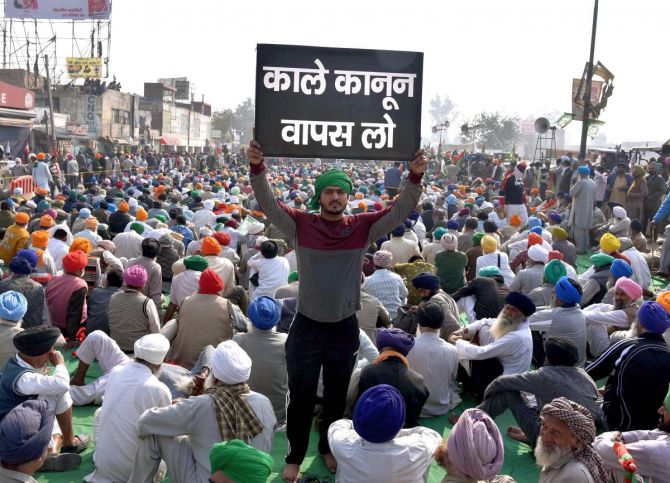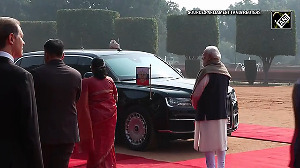'Punjab elections are there and so are UP elections. They must have done some calculations (before announcing the repeal).'

Prime Minister Narendra Damodardas Modi on Friday, November 19, morning suddenly withdrew the controversial three farm laws brought in by his government.
The three farm laws were supposed to change the face of the farming sector in India but met with a mountain of protests from the very farmers it claimed to benefit, ever since it was passed by Parliament in September 2020.
For months now farmers from Punjab and Haryana have assembled on the roads of Delhi to hold a year-long dharna against the three laws.
With both sides refusing to resile from their position, the Supreme Court of India had to intervene and formed a four-member committee to study the laws and break the logjam between the farmers unions and the Government of India.
Agricultural economist Ashok Gulati was one of the members of the committee and has been strongly advocating the three farm laws and articulating that they are very good for India's future.
After Modi announced the repeal of the farm laws on Friday morning, Syed Firdaus Ashraf/Rediff.com asked Professor Gulati about what the future holds for Indian agriculture.
The first of a two-part interview:
Your first reaction on the government withdrawing the three farm laws.
Prime Minister Narendra Modi said in his speech that there was a communication gap (from the government side) and they failed to explain to the farmers.
He also said the three farm laws were brought with the best intentions and right directions, but the farmers were adamant on their demand for withdrawal.
So it is okay, stay where you are and do what you are doing. That's it.
You were appointed by the Supreme Court as one of the negotiators to build a bridge between the farmers union and government on these three laws.
Why do you think the farmers were not convinced by the government's point of view?
I am not the government, I am an analyst. You have to understand one thing about our country: Whenever some policies are made there is a lot of politics involved in it. You know that elections are coming, so let us see what happens.
Do you feel the repeal of these farm laws is harmful in the long-term interest of our country?
That is going to happen, but the farmers lobby wants to do what they want, so let them do. What can I say about it?
I believed that these three farm laws was a 1991-like reform movement. Now the farmers don't want it so the government rolled back.
How will the farm sector be affected after the repeal of these laws?
Look at what is happening in Punjab. Water levels are depleting in Punjab. They are stuck in (producing) wheat and rice which India does not need.
It is harmful for the environment and on top of that there is stubble burning. It is an environmental disaster.
Now society does not want to understand that, so society will pay a heavy price in the future.
Do you feel political compulsions lead to such decisions which ultimately harm the interests of the country?
Political calculations are always there. Punjab elections are there and so are Uttar Pradesh elections. They must have done some calculations (before announcing the repeal).
In a democracy, it is always free this and free that. This is not good for the country and it has long term consequences.
This (repeal) was all about short term politics. There is no medium to long term perspective.
Every chief minister is competing with another chief minister to give free power, free fertilisers and free everything. Factory bhi free de do sabko.
In an earlier interview with me you said nobody bothers about the huge output of wheat and rice in our country. They want to just produce these two items in huge quantities so they rot in FCI (Food Corporation of India) godowns. Will this continue now?
We have so many stocks lying in FCI godowns which have no purpose. It is a huge cost. Rs 150,000 crore is locked in without a purpose.
Look at the FCI stock, we have three times more stock than the buffer system. It is a huge inefficiency in the system. We are in a trap and if the government does not want to change, God bless them.
You feel politics should be separate from economics.
You should be able to explain to your clients, and that is a political exercise.
Unfortunately, a very different narrative was created by the Opposition parties on these three farm laws. And you know the Opposition parties oppose anything the government does because it is their job to do so.
Today they are selling Air India, and the Opposition will tell you the government is selling your house utensils and ask why is the government doing it? They will bring one lakh people on the roads to oppose the government's move.
They have a right to do that in a democracy, but it is the job of the government to tell the people and convince them about their policies.










